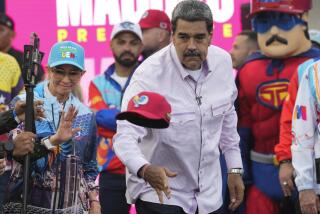Backing a Slow Horse
- Share via
Nicaragua’s contra rebels, freshly outfitted with the help of $100 million from the Reagan Administration, have started a spring offensive, hoping to persuade the U.S. Congress and the Sandinista government that they are a force to be reckoned with. Battlefield reports indicate that President Reagan has his money on a slow horse.
The rebels want as many as 15,000 guerrillas to infiltrate Nicaragua from base camps in neighboring Honduras. Guerrilla attacks occur almost daily in sparsely populated regions of Nicaragua, mainly the mountainous north. But whether these attacks actually tip the military scales in the contras’ favor or whether they will swing the populace away from the Sandinistas is open to serious question.
Correspondents report that contra units are better equipped and better trained than ever. With computerized radios, hand-held anti-aircraft missiles and other modern equipment, they may be the best-equipped guerrilla army in history. They are described by some as a bit cocky as they head into Nicaragua. But, once inside Nicaragua, they show dangerous weaknesses. Reporters for the New York Times and Newsweek magazine report that, for all their bravado and technical training, they breach military discipline by such acts as playing radios full blast at night, and commit political errors by stealing food and forcing innocent peasants to act as their guides through dangerous territory.
Times correspondent Marjorie Miller reported last week that some contra officers were refusing to cooperate with their own human-rights investigators--contra sympathizers trying to make sure that their troops obey the rules of warfare set down by the Geneva Convention. The contra human-rights commission was created at the insistence of Congress to investigate reports of needless killings, violence and coercion of civilians. Several contra officers barred investigators from their camps. relenting only after U.S. officials intervened.
The reports certainly suggest that, for all their U.S. support, the contras still are not particularly effective guerrillas, perhaps not even a legitimate alternative to the Sandinistas. With their new equipment, they probably can inflict casualties and disrupt an already-weak Nicaraguan economy, but they seem no closer to defeating the Sandinistas than they ever were. What’s more, past experience shows that as the contras rearm and retrain, so does a much larger Sandinista army.
Even contra leaders admit that if U.S. aid stops, so does their effort to topple the Sandinistas. And despite Reagan’s sentimental commitment to the contras, Administration officials talk as though they don’t expect a contra victory before the end of Reagan’s term in office, if ever. In private meetings they have returned to an argument that all they want from the contras is enough pressure on Managua to force the Sandinistas to negotiate--something that the Sandinistas have long said they are willing to do. Diplomatic sabotage by the Administration has kept talks from getting anywhere.
The latest contra offensive seems designed more to win over Congress than the Nicaraguan people. Apparently Reagan wants to make it difficult for Congress to cut off aid to the contras, even after the shabby revelations of the Iran-contra scandal. The slightest contra claim to battlefield success might allow him to coax another $100 million or so out of Congress to fund the contras in 1988. They still probably couldn’t win, but it would be enough to keep them in the field until 1989, when Reagan could turn over the bloody mess in Central America to his successor. That is not exactly statesmanship, but statesmen are in dismally short supply in this Administration. The only hope for a dignified diplomatic end to the Central American misadventure once more lies with Congress.
More to Read
Sign up for Essential California
The most important California stories and recommendations in your inbox every morning.
You may occasionally receive promotional content from the Los Angeles Times.













